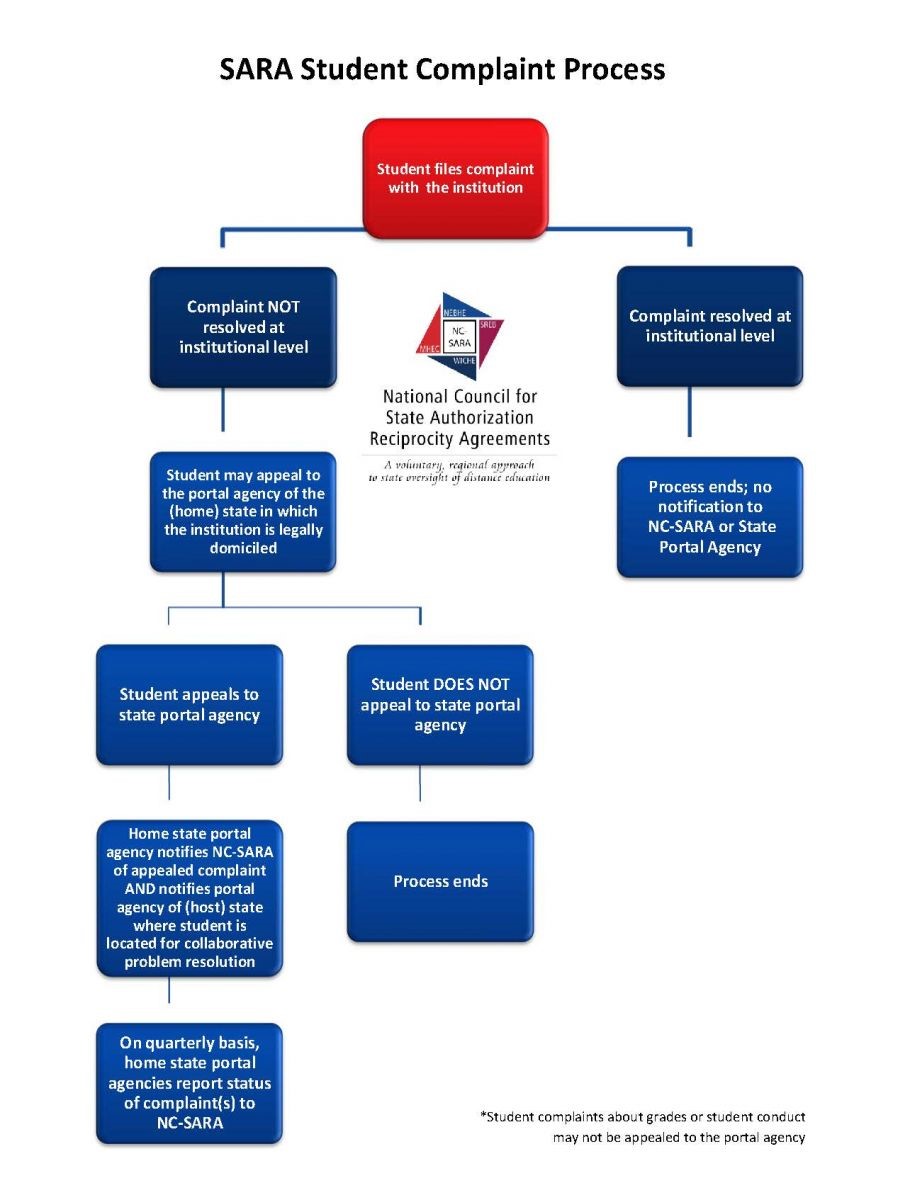Federal Student Complaint Requirements – Is Your Institution in Compliance Today?
Published by: WCET | 8/15/2017
Tags: Complaint Process, SAN, SARA, State Authorization, Student Success
Published by: WCET | 8/15/2017
Tags: Complaint Process, SAN, SARA, State Authorization, Student Success
Does your institution have a well designed, easily understood, and compliant complaint process? Today we welcome Cheryl Dowd, Director of the State Authorization Network, and Jennifer L. Parks, Director, Midwestern State Authorization Reciprocity Agreement (M-SARA), to review the federal student complaint requirements. They also provide recommendations for implementation of the complaint process notification and review the SARA student complaint process.
Thank you Cheryl and Jennifer for your helpful post and support!
Enjoy the read and enjoy your day,
~Lindsey Downs, WCET
The complaint process for students can be very confusing and complex. The institution’s goal should be a “student friendly” explanation of the complaint process and MUST include the contact information for the institution’s accreditor and location of the appropriate state agency for the student’s complaint.
In 2010, when the first set of Federal regulations for State authorization of distance education were released, and then ultimately vacated by the courts, there was another important regulation released. Another part of the “program integrity” regulatory changes was not vacated and remains enforceable for compliance by institutions.
Do you all remember §34 CFR 668.43 (b)?
This regulation requires institutions to notify all current and prospective students of the process and contact information for filing complaints. Now that the State Authorization Reciprocity Agreement (SARA) is the state compliance mechanism for many institutions for their out-of-state activities, additional questions about the impact of SARA on this regulation have been raised. In this post we will address the requirements, offer direction for implementation, and share more information about the SARA complaint process.

Let’s start with the regulation itself:
(b) The institution must make available for review to any enrolled or prospective student upon request, a copy of the documents describing the institution’s accreditation and its State, Federal, or tribal approval or licensing. The institution must also provide its students or prospective students with contact information for filing complaints with its accreditor and with its State approval or licensing entity and any other relevant State official or agency that would appropriately handle a student’s complaint.
A July 2011 WCET blog post, Federal Student Complaint Regulations – Common Misconceptions, included a helpful chart. The chart breaks down the requirements provided in this regulation. In essence, there are three main points the institution must follow related to notification of a complaint process.
You may wonder, what type of complaints are we talking about here? This process refers to the student’s available recourse if the student has exhausted all possible avenues for complaints at the institution related to consumer protection and the issue has not been resolved to the student’s satisfaction. There are also rare circumstances in which a student may take a complaint to a state entity if the institution has been non-responsive, abusive to the student, or otherwise has lost the confidence of the student. The issues that could be reviewed outside of the institution do NOT typically include issues related to grade disputes or student conduct. The state entities that process these inquiries are well-versed on when to take a complaint or refer a student back to the college or university.
 One of the most beneficial outcomes of the State Authorization Reciprocity Agreement (SARA) is that it streamlines the path student complaints follow when the student and the institution are located in different states. The SARA student complaint process incorporates processes outlined in Federal code and required by accreditors but also clarifies in which state a student can file a complaint that rises above the institutional level.
One of the most beneficial outcomes of the State Authorization Reciprocity Agreement (SARA) is that it streamlines the path student complaints follow when the student and the institution are located in different states. The SARA student complaint process incorporates processes outlined in Federal code and required by accreditors but also clarifies in which state a student can file a complaint that rises above the institutional level.
As described previously, each state is required under §34 CFR 600.9 (a) (1) to have an appropriate process and entity to address student consumer complaints about the institution in which a student is or was previously enrolled. When a state and a school agree to participate in SARA, they also agree that when a student complaint rises to the state level for resolution, it is ultimately resolved by the SARA state portal entity in the state in which the institution is located. As with the general student complaint process, grade disputes and student conduct complaints cannot be addressed through the SARA process. In the SARA process, those types of complaints are resolved at the institutional level.
Every SARA institution is required to provide information on its institutional website explaining how students who attend the institution from another state via distance education can appeal a complaint that has exhausted the institutional complaint process. If after exhausting the institutional process a student feels a complaint has still not been adequately addressed, the student can file a complaint with the SARA State Portal Entity of the state in which the institution is located. The state portal entity is required to provide information on its portal entity website explaining how students located in other SARA states but attending SARA institutions in that state can escalate complaints to the state portal entity.
More detailed information about the SARA student complaint process can also be found on the NC-SARA website and in the NC-SARA manual.

If you are with an institution, you will want to check at your institution to see what, where, and how the institution is notifying students about its complaint process. The bottom line that you may wish to share with others at your institution includes the following:
The WCET State Authorization Network (SAN) and National Council – State Authorization Reciprocity Agreements (NC-SARA) are available to support your institution in its research and best practices for implementation of processes to meet the federal and state regulations for state authorization compliance.

Cheryl Dowd
Director, State Authorization Network
WCET

Jennifer L. Parks
Director, Midwestern State Authorization Reciprocity Agreement (M-SARA)
Midwestern Higher Education Compact (MHEC)

1 reply on “Federal Student Complaint Requirements – Is Your Institution in Compliance Today?”
[…] August of 2017, the WCET Frontiers blog explained the context for these regulations and provided more detailed information on how to comply. In addition, you may wish to review resources available on the SAN Website Student Complaints […]